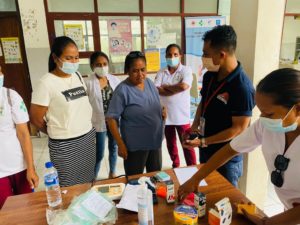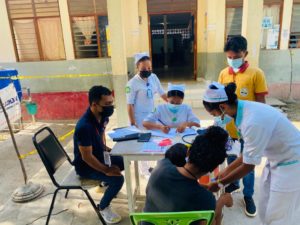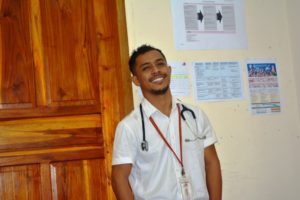
One of the most rewarding things we can do in the health sector in Timor Leste – is to strengthen it. We all know that a stronger health system means a healthier country. Upskilling doctors and nurses is making real and permanent change.
Meet Guerson, a nurse educator working with our Nursing Training/COVID Programme. Guerson works with the team focusing on training healthcare workers – the frontline defenders – on respiratory Triage, Infection Prevention Control, Patient Flow and Triage Set up in some of the 65 Community Health Centres (CHC) throughout Timor-Leste.
The heart of Maluk Timor is about creating sustainable change with in the health sector. The impact it is having on the Community Health Centres is immeasurable, and from what I see we have saved many lives.
“What can you teach us? You are our junior.”
My greatest challenge, probably in my life, was when I started at Maluk Timor. I was to conduct training at a CHC where I had interned at relatively recently. The staff were surprised to see a young graduate standing in front of them. “What can you teach us? You are our junior.” We were teaching you as a nurse intern. I took a deep breath and said that the science is always changing. I’m only here to show you the guidelines and by using triage how we protect ourselves and our patients; protect our families and our community.
Until this day, the CHC is still practicing triage, as well as all the things we teach to prevent infectious disease. It is an honour to be a nurse and I am proud to be with Maluk Timor. Together we can continue this vital work and making the health system and stronger and better place.
Triage is important in any medical setting, but even more so during the COVID pandemic that has swept the world and our little nation of Timor-Leste.
Why I became a nurse educator
I am a nurse educator with Maluk Timor’s COVID/Nursing Training Programme.
I became a nurse for three reasons.
Firstly, It was the first profession that I understood as I was growing up as my uncle is a nurse. Secondly, culturally in my country, parents wants one of the children to be a healthcare professional to be able to help look after the family.
Finally, when I was at senior high school – I would see nursing students walk past my home in their uniforms, and I fell in love with the uniform.
Prevention is better than cure
Long before I started working at MT, my passion was always health promotion and prevention rather than cure. As a nurse, we were taught to focus on one patient, to try to make them well again. But I believe that to solve a problem, you have to know what is the cause, and then you can prevent it from happening again.
After graduation, there were no jobs and a few friends and I wanted to do something. We decided to focus on educating secondary students about HIV. We chose HIV/Aids as we researched it and learnt how quickly transmission of HIV can grow if not checked. We wanted people to understand how prevention is better than cure.
It’s funny, during our research, we heard about Maluk Timor and the HIV Clinic they work in. We met with the team to learn more and see if we could get some help.
They were great and really encouraging.
It’s like a full circle as now I work with MT.
So with encouragement, knowledge, our motivation and a borrowed projector from my uncle – we started educating students about HIV and prevention.
COVID intervened, as it did in all our lives, and I joined the volunteers of Timor-Leste Red Cross. Working through the Ministry of Health COVID prevention programme, we carried out screening, surveillance at the quarantine centres, and health promotion, mainly in border areas.
It was a busy time, and often difficult trying to convince the community that this unseen pandemic would soon come to our country while the world was over taken with a wave that has devastated so many lives in every country in the world.
I joined the COVID team at Maluk Timor in July 2020. The work was perfect for me. I could continue my passion for working within the community, especially the healthcare workers, to increase the capacity of doctors and nurses in in the government run Community Health Centres. Through our training with Respiratory triage, Infectious Disease Control (IPC), vaccinating against COVID, health education, and setting up triage stations, we could help prevent COVID.
We would follow up our trainings with supervision of the CHC’s triage; to ensure that what we have taught in our training is understood and followed through. We have also trained staff from WHO and the National Health Institute (INS) to deliver training about AstraZeneca and Pfizer vaccinations; we work with other NGO’s like Care and Caritas , which we trained Health promotion (Socialisation) and how to live with the “New Normal” of COVID.
As a Nurse Educator – we take the small victories of change that we have created and are grateful.
I see the outcomes and I know I was part of making that change happen. In a remote village we visited we found that all the staff in the CHC had done the training, including the cleaner, the driver and security guard. The Chief of the CHC explained, that they were a really small CHC, when it was busy, it was “all hands on deck”. The cleaner and security guard, with the help from the driver, could start the patients into the Triage process; by making sure they had masks, had washed their hands and were keeping a safe distance until the healthcare workers could process them. “We are all in this together to keep our community safe”, said the Chief.
In a remote CHC – often having consumables like masks, hand sanitiser, disinfectant etc – can take a long time to reach the CHC. The staff at a CHC nestled on a hilltop – were really motivated by the training – they had the driver and the cleaner do the training as well. They could help with getting people to socially distance, wash hands and have masks – before the triage.
Anyway, the consumables started to run out. And didn’t want to stop doing the IPC – so while they were waiting to come they made disinfectant from bleach which they could find in the village – and made a hand sanitizers using a very weak solution; they had to use scarves sometimes when there were no more masks and washed them all the time. Its not perfect – but it was better than abandoning IPC and having a potential outbreak.
One of the villages we trained in, the Chief of the CHC took triage to a whole other level. He realised that COVID must teach us new lessons and make us do our jobs better now and the future. He found some materials and a place at the CHC and is building a permanent triage. There are many infectious diseases and other medical emergencies. COVID will probably not be the only pandemic we face, by having a permanent triage and good practices in IPC for always; we will be a stronger and healthier community.
Water remains a big problem in Timor – even for some of the CHC’s having easy access to permanent water is rare. One of the CHC’s we trained at had an enormous handwashing stand but no access to permanent water. We have seen several of these washing stands throughout our travels, many without water. The logistics were too great an obstacle. Carting water and tank stands in remote areas were not viable options. We sat down together with the Chief and we tried to find a solution.
We returned three weeks later to do a follow-up supervision–. The Chief wanted to keep his Clinic and Community healthy and COVID free – he was motivated – he knew prevention was better than cure. He sat down with others in the community and together found a permanent water supply, found the hose and the means to connect over a distance. Now all the patients coming to the CHC are washing their hands on arrival. It’s simple but so important.
Creating less risk as COVID enters our lives
In yet another CHC, after the triage training, the Chief was thinking about different ways COVID could spread and the impacts that it could have of the staff and the community if COVID started to spread. It could close down CHC if all the staff got sick! Everyone from the cleaner to the administration staff were at risk. Using the knowledge, he learnt at the training he started to think about creating less risk. He dedicated one of the staff to act as liaison between patient and administrator staff.
Instead of bringing all the paper work to the counter for processing, the HCW would talk to the patient, take all the relevant details, and then pass them onto the administration staff, who could find the relevant records, and then the patient could pass through triage. This had a twofold effect – as it ensured that patient’s records were organised and easy to access.
While we were only working in CHC’s – we had a questions about how do we do triage in the Health Posts. Often there is only one healthcare worker. This is where the importance of IPC comes in. With limited staff and limited equipment – here the focus has to be IPC – wearing masks social distancing and taking responsibility and our jobs seriously – with some basic knowledge of triage and practising IPC – is a strong start.
To protect ourselves, to protect our patients, to protect our community and protect our country.



